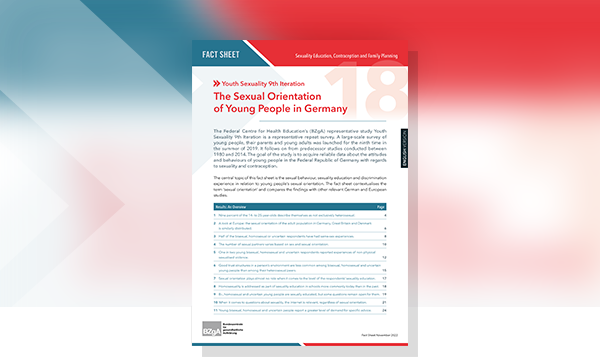The Federal Centre for Health Education’s (BZgA) representative study Youth Sexuality 9th Iteration is a representative repeat survey. A large-scale survey of young people, their parents and young adults was launched for the ninth time in the summer of 2019. It follows on from predecessor studies conducted between 1980 and 2014. The goal of the study is to acquire reliable data about the attitudes and behaviours of young people in the Federal Republic of Germany with regards to sexuality and contraception.
The central topic of this fact sheet is the sexual behaviour, sexuality education and discrimination experience in relation to young people’s sexual orientation. The fact sheet contextualises the term ‘sexual orientation’ and compares the findings with other relevant German and European studies.
Results: An Overview
- Nine percent of the 14- to 25-year-olds describe themselves as not exclusively heterosexual.
- A look at Europe: the sexual orientation of the adult population in Germany, Great Britain and Denmark is similarly distributed.
- Half of the bisexual, homosexual or uncertain respondents have had same-sex experiences.
- The number of sexual partners varies based on sex and sexual orientation.
- One in two young bisexual, homosexual and uncertain respondents reported experiences of non-physical sexualised violence.
- Good trust structures in a person’s environment are less common among bisexual, homosexual and uncertain young people than among their heterosexual peers.
- Sexual orientation plays almost no role when it comes to the level of the respondents’ sexuality education.
- Homosexuality is addressed as part of sexuality education in schools more commonly today than in the past.
- Bi-, homosexual and uncertain young people are sexually educated, but some questions remain open for them.
- When it comes to questions about sexuality, the internet is relevant, regardless of sexual orientation.
- Young bisexual, homosexual and uncertain people report a greater level of demand for specific advice.


